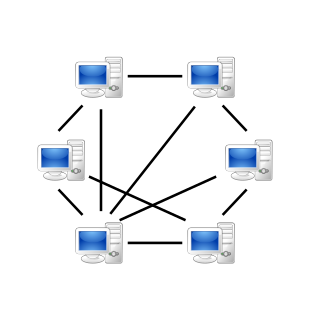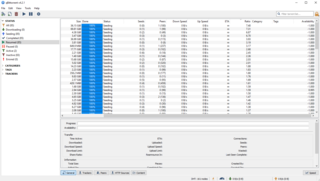Related Research Articles

Peer-to-peer (P2P) computing or networking is a distributed application architecture that partitions tasks or workloads between peers. Peers are equally privileged, equipotent participants in the application. They are said to form a peer-to-peer network of nodes.
Spoof, spoofs, spoofer, or spoofing may refer to:
MediaDefender, Inc. was a company that fought copyright infringement that offered services designed to prevent alleged copyright infringement using peer-to-peer distribution. They used unusual tactics such as flooding peer-to-peer networks with decoy files that tie up users' computers and bandwidth. MediaDefender was based in Los Angeles, California in the United States. As of March 2007, the company had approximately 60 employees and used 2,000 servers hosted in California with contracts for 9 Gbit/s of bandwidth.
i2hub was a peer-to-peer file sharing service and program designed and intended primarily for use by university and college students.
The eDonkey Network is a decentralized, mostly server-based, peer-to-peer file sharing network created in 2000 by US developers Jed McCaleb and Sam Yagan that is best suited to share big files among users, and to provide long term availability of files. Like most sharing networks, it is decentralized, as there is no central hub for the network; also, files are not stored on a central server but are exchanged directly between users based on the peer-to-peer principle.
The open music model is an economic and technological framework for the recording industry based on research conducted at the Massachusetts Institute of Technology. It predicts that the playback of prerecorded music will be regarded as a service rather than as individually sold products, and that the only system for the digital distribution of music that will be viable against piracy is a subscription-based system supporting file sharing and free of digital rights management. The research also indicated that US$9 per month for unlimited use would be the market clearing price at that time, but recommended $5 per month as the long-term optimal price.
Peer-to-peer file sharing is the distribution and sharing of digital media using peer-to-peer (P2P) networking technology. P2P file sharing allows users to access media files such as books, music, movies, and games using a P2P software program that searches for other connected computers on a P2P network to locate the desired content. The nodes (peers) of such networks are end-user computers and distribution servers.
File sharing in Canada relates to the distribution of digital media in that country. Canada had the greatest number of file sharers by percentage of population in the world according to a 2004 report by the OECD. In 2009 however it was found that Canada had only the tenth greatest number of copyright infringements in the world according to a report by BayTSP, a U.S. anti-piracy company.
Arts and media industry trade groups, such as the International Federation of the Phonographic Industry (IFPI) and Motion Picture Association of America (MPAA), strongly oppose and attempt to prevent copyright infringement through file sharing. The organizations particularly target the distribution of files via the Internet using peer-to-peer software. Efforts by trade groups to curb such infringement have been unsuccessful with chronic, widespread and rampant infringement continuing largely unabated.
File sharing is the practice of distributing or providing access to digital media, such as computer programs, multimedia, program files, documents or electronic books/magazines. It involves various legal aspects as it is often used to exchange data that is copyrighted or licensed.
P4P, or proactive network provider participation for P2P, is a method for internet service providers (ISPs) and peer-to-peer (P2P) software to optimize peer-to-peer connections. P4P proponents say that it can save an ISP significant costs, and that using local connections also speeds up download times for P2P downloaders by 45%, critics say that this will favor downloaders on some ISPs but come at the expense of others.

The Motion Picture Association (MPA) is an American trade association representing the five major film studios of the United States, as well as the video streaming service Netflix. Founded in 1922 as the Motion Picture Producers and Distributors of America (MPPDA) and known as the Motion Picture Association of America (MPAA) from 1945 until September 2019, its original goal was to ensure the viability of the American film industry. In addition, the MPA established guidelines for film content which resulted in the creation of the Motion Picture Production Code in 1930. This code, also known as the Hays Code, was replaced by a voluntary film rating system in 1968, which is managed by the Classification and Rating Administration (CARA).

Copyright infringement is the use of works protected by copyright law without permission for a usage where such permission is required, thereby infringing certain exclusive rights granted to the copyright holder, such as the right to reproduce, distribute, display or perform the protected work, or to make derivative works. The copyright holder is typically the work's creator, or a publisher or other business to whom copyright has been assigned. Copyright holders routinely invoke legal and technological measures to prevent and penalize copyright infringement.
File sharing is the practice of distributing or providing access to digital media, such as computer programs, multimedia, documents or electronic books. File sharing may be achieved in a number of ways. Common methods of storage, transmission and dispersion include manual sharing utilizing removable media, centralized servers on computer networks, World Wide Web-based hyperlinked documents, and the use of distributed peer-to-peer networking.
File sharing in the United Kingdom relates to the distribution of digital media in that country. In 2010, there were over 18.3 million households connected to the Internet in the United Kingdom, with 63% of these having a broadband connection. There are also many public Internet access points such as public libraries and Internet cafes.
Music piracy is the copying and distributing of recordings of a piece of music for which the rights owners did not give consent. In the contemporary legal environment, it is a form of copyright infringement, which may be either a civil wrong or a crime depending on jurisdiction. The late 20th and early 21st centuries saw much controversy over the ethics of redistributing media content, how much production and distribution companies in the media were losing, and the very scope of what ought to be considered piracy – and cases involving the piracy of music were among the most frequently discussed in the debate.
Torrent poisoning is intentionally sharing corrupt data or data with misleading file names using the BitTorrent protocol. This practice of uploading fake torrents is sometimes carried out by anti-infringement organisations as an attempt to prevent the peer-to-peer (P2P) sharing of copyrighted content, and to gather the IP addresses of downloaders.
The Center for Copyright Information (CCI) is an American organization focused on advocacy and initiatives in support of copyright law. The CCI aims to educate the public about copyright law; coordinates with copyright owners and Internet service providers (ISPs) about issues related to online copyright infringement; assists with the design, implementation, review, and promotion of an online infringement notification and mitigation system ; collects and disseminates online infringement data; and promotes lawful means of obtaining copyrighted works. The organization was created as a partnership between industry associations, including the Motion Picture Association of America, the Recording Industry Association of America, and five major American Internet service providers.

Online piracy is the practice of downloading and distributing copyrighted content digitally without permission, such as music or software. The principle behind piracy has predated the creation of the Internet, but its online popularity arose alongside the internet. Despite its explicit illegality in many developed countries, online piracy is still widely practised, due to both the ease with which it can be done and the often defensible ethics behind it.
Tamil Rockers is a torrent website which facilitates the illegal distribution of copyrighted material, including television shows, movies, music and videos. The site allows visitors to search for and download copyrighted material with the help of magnet links and torrent files, which facilitate peer-to-peer file sharing. In India, ISPs have been ordered to block access to the website. The website continues operation by switching to a series of new web addresses. Aside from its traditional list of pirate sites, apps, and hosting providers, the movie industry group MPAA now lists Tamil Rockers as one of the notorious markets.
References
- ↑ Record industry 'spoofs' net pirates, BBC News. 4 July 2002.
- ↑ Chartrand, Sabra. New Way to Combat Online Piracy, New York Times. May 17, 2004.
- ↑ Murray, Brian H. Defending the Brand: Aggressive Strategies for Protecting Your Brand in the Online Arena, AMACOM, pg. 119, October 31, 2003.